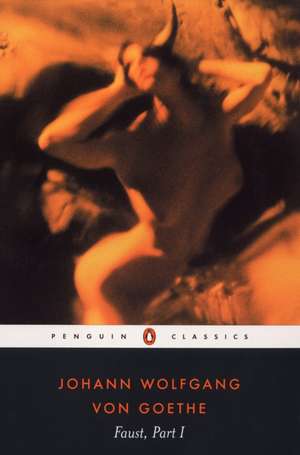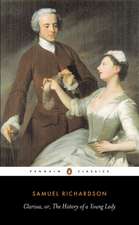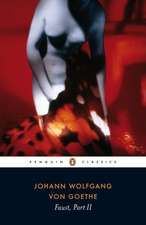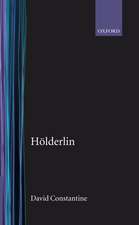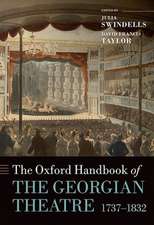Faust, Part I: Faust, cartea 1
Autor Goethe Prefață de A. S. Byatt Traducere de David Constantineen Limba Engleză Paperback – 27 iul 2005
A.S. Byatt's preface considers Goethe's lifelong relationship with the myth of Faust and its influence on modern literature. This edition includes an introduction by the translator, a chronology, suggestions for further reading, explanatory notes, and an addendum on the writing of Faust.
For more than seventy years, Penguin has been the leading publisher of classic literature in the English-speaking world. With more than 1,700 titles, Penguin Classics represents a global bookshelf of the best works throughout history and across genres and disciplines. Readers trust the series to provide authoritative texts enhanced by introductions and notes by distinguished scholars and contemporary authors, as well as up-to-date translations by award-winning translators.
Preț: 52.79 lei
Preț vechi: 63.22 lei
-16% Nou
Puncte Express: 79
Preț estimativ în valută:
10.10€ • 10.57$ • 8.36£
10.10€ • 10.57$ • 8.36£
Carte disponibilă
Livrare economică 20-26 martie
Livrare express 28 februarie-06 martie pentru 28.45 lei
Preluare comenzi: 021 569.72.76
Specificații
ISBN-13: 9780140449013
ISBN-10: 0140449019
Pagini: 240
Dimensiuni: 129 x 198 x 14 mm
Greutate: 0.2 kg
Ediția:Revizuită
Editura: Penguin Books
Colecția Penguin Classics
Seria Faust
Locul publicării:London, United Kingdom
ISBN-10: 0140449019
Pagini: 240
Dimensiuni: 129 x 198 x 14 mm
Greutate: 0.2 kg
Ediția:Revizuită
Editura: Penguin Books
Colecția Penguin Classics
Seria Faust
Locul publicării:London, United Kingdom
Notă biografică
Johann Wolfgang von Goethe was born in Frankfurt-on-Main in 1749. He studied at Leipzig, where he showed interest in the occult, and at Strassburg, where Herder introduced him to Shakespeare’s works and to folk poetry. He produced some essays and lyrical verse, and at twenty-two wrote Götz von Berlichingen, a play which brought him national fame and established him in the current Sturm und Drang movement. This was followed by the novel The Sorrows of Young Werther in 1774, which was an even greater success.
Goethe began work on Faust, and Egmont, another tragedy before being invited to join the government of Weimar. His interest in the classical world led him to leave suddenly for Italy in 1786 and the Italian Journey recounts his travels there. Iphigenia in Tauris and Torquato Tasso, classical dramas, were written at this time. Returning to Weimar, Goethe started the second part of Faust, encouraged by Schiller. In 1806 he married Christiane Vulpius. During this late period he finished his series of Wilhelm Master books and wrote many other works, including The Oriental Divan (1819). He also directed the State Theatre and worked on scientific theories in evolutionary botany, anatomy and color. Goethe completed Faust in 1832, just before he died.
Goethe began work on Faust, and Egmont, another tragedy before being invited to join the government of Weimar. His interest in the classical world led him to leave suddenly for Italy in 1786 and the Italian Journey recounts his travels there. Iphigenia in Tauris and Torquato Tasso, classical dramas, were written at this time. Returning to Weimar, Goethe started the second part of Faust, encouraged by Schiller. In 1806 he married Christiane Vulpius. During this late period he finished his series of Wilhelm Master books and wrote many other works, including The Oriental Divan (1819). He also directed the State Theatre and worked on scientific theories in evolutionary botany, anatomy and color. Goethe completed Faust in 1832, just before he died.
A. S. Byatt, novelist, short-story writer, and critic, is the author of many books, including Possession, winner of the Man Booker Prize.
